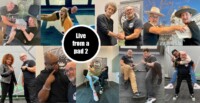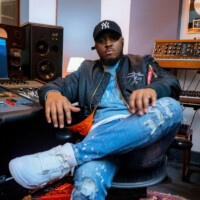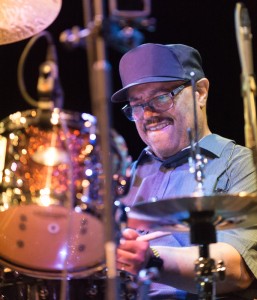 Taking his first steps behind the drum kit at the tender age of four, nobody knew back then that Dennis Chambers had set out on a career that would make him one of the most recognised names in drumming history.
Taking his first steps behind the drum kit at the tender age of four, nobody knew back then that Dennis Chambers had set out on a career that would make him one of the most recognised names in drumming history.
Joining Parliament/Funkadelic at the age of 18 really kickstarted young Dennis’ career and, together with becoming the house drummer for Sugar Hill Records two years later, paved the way to a life of extensive touring and recording all around the globe. So far, he’s worked with just about everybody including Santana, John Scofield, Brecker Brothers, John McLaughlin, Mike Stern and many more.
After a medical set-back in 2014, and a resulting year off the drum chair, Chambers got back in the drivers seat and is once again inspiring people worldwide as a live drummer and clinician.
I sat down with Dennis at the UK Drum Show to talk about his upbringing, the time he got offered the James Brown gig, Santana and much, much more.
You never had any formal training. What was your way into drumming?
I started playing drums at the age of four because of my mum. She was a singer and watching her band practise was the only thing that kept me still. I can remember the drummers name was Boonie and he played a Champagne Sparkle Gretsch four-piece kit. I can still see it in my mind. When they finished I would pick up knives and forks and things like that and start playing. Actually that all happened before I was four, my parents then bought me a drum kit when I was four.
With nobody to train me I just started playing the rhythms I heard – or at least tried to play the rhythms on the records that I was listening to. A lot of James Brown, a lot of Motown, a lot of Stax… you know, Al Jackson, Aretha Franklin and Dee Dee Warwick who had Bernard Purdie on drums. In fact, Dee Dee Warwick had a song called “Foolish Fool” and that’s where Led Zeppelin got their whole idea of their drum sound. You need to check it out! And that’s why Bernard Purdie was one of John Bonham’s favourites, because of those earlier recordings he heard him play on. That was one of them and that’s what got me going.
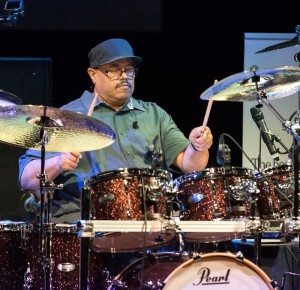 So all the technical aspects – you play open handed from time to time; the traditional grip – are just things you saw somewhere and picked up yourself?
So all the technical aspects – you play open handed from time to time; the traditional grip – are just things you saw somewhere and picked up yourself?
Yeah. Back in the 60s the correct way of playing was traditional grip and every time someone caught you doing anything else they would correct you. “Dude, you’re holding your sticks wrong. This is the way!”. Then Billy Cobham came on the scene and just threw that out of the window. When I saw him play with Horace Silver in the 60s he was leading with the left but playing traditional grip with the right hand – it was weird. They all just looked at him going “He’s a wrong player”. But then when he played with Mahavishnu – who’s gonna question that?! Nobody could play like that. I don’t know where drumming would be in 2017 if it wasn’t for guys like him, Tony Williams, Jack DeJohnette, Lenny White and David Garibaldi. If it wasn’t for people like that we wouldn’t have all this [the UK Drum Show]. A lot of guys don’t know that they’ve somehow, in some way, learned things form people like Billy Cobham; whether they realise it or not.
You went straight from high school to your first pro gig ‘Bride of Frankenstein’. Was it a conscious decision to do drumming for a living?
Nah, I was one of those kind of guys who was just lucky. I mean, I was offered a gig with James Brown when I was 13.
You have to tell me more about that!
I was playing at his motor inn in Maryland, we were on a break and I went to the bathroom and he is standing there picking out his Afro while I’m washing my hands. I look in the mirror, look up… holy moly, that’s James Brown! I went: “Mr. Brown, it’s an honour to meet you… bla, bla, bla…. I’m happy to be playing at your motor inn, we happen to be a James Brown cover band, it would be great if you came and see us.” He went: “Yeah, yeah kid”, but he never looked at me, he was just standing there singing to himself.
I went back and told the band but they wouldn’t believe me. We went back on stage and played the second set and the door opens and this entourage of people came in and sat in the corner. Our singer looked at me weird but we still didn’t know because it was dark. Then we were back on another break and this big, wall-like dude came over to me and said: “Mr. Brown requests your presence at his table”. I went over and talked to him. He said: “You have a nice backbeat kid.” – “Thanks Mr. Brown.” – “What do you think about joining my band?”. I was just thinking he was joking but obviously said it would be great. He goes: “What would it take?”. I’m getting all excited and then all over sudden I remembered my mum… . I tell him that we have a problem: I’m still at school and you’ll gotta to talk to my mum. He goes: “Talk to your mum? Well ok. Give me her phone number”.
For like three weeks I would come home asking mum if there were any phone calls but there was nothing. I thought she’s keeping it from me or maybe it was true and he didn’t try to call, so I just gave up. One day the phone rings and it’s a lady from James Brown’s office saying she wants to speak to Dennis Chambers. I said it’s me and she put me through to James himself: “Hey kid, how are you doing?”. We had a little chat, he told me about the weather where he was and all that but I figured he wanted to speak to my mum so I put her on the line. She didn’t believe it at first but after talking to him for a bit her reaction was “Oh my god!”. He asked her what it would take for her to allow me to leave on tour with him and she said I would need a tutor. He thought about it but then said he couldn’t do that – which is weird because back then he was a strong advocate for education. He used to say ‘Don’t be a fool – stay in school’ but yet he wouldn’t offer me a tutor.
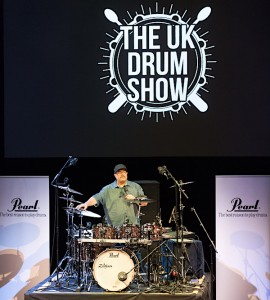 Did you ever speak to your mum again after this?!
Did you ever speak to your mum again after this?!
Oh yeah – but I hated school from that point. I hated it with a passion.
But when I joined P-Funk later on I got to know Bootsy, Maceo, Fred, Kush – all the guys who had played with him – and I thought thank God I didn’t take the gig. I found out the guy was crazy, who knows how I would have turned out.
I’ve always been lucky. My whole career has been based on playing with people that I grew up listening to.
You were only 18 when you started playing with P-Funk – that’s still incredibly early. Has funk/fusion always been a passion?
Yeah, growing up in my house you had to listen to all kinds of music. My mother was a serious music fan. She had Dave Brubeck records, Art Blakey’s records, Miles’ records all along with Motown and everything that was out there.
Another long term gig of yours is Santana.
Yes, that’s an interesting story. Back in 1986 I got a call from his manager saying that I was recommended for the gig by his drummer at the time Chester Thompson, who had to go back with Genesis I think. So they hired me and fired me all within the same week. They hired me without hearing me because of Chester’s recommendation but then fired me because Carlos didn’t feel like rehearsing. He had some time at home and just didn’t want to rehearse the band so he figured he’d get Graham Lear back (who had done the gig before) he wouldn’t have to rehearse.
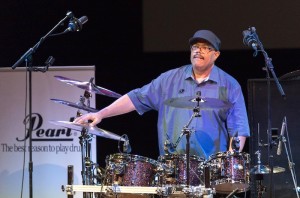 Years and years go by, I’m at the Montreux with John McLaughlin opening for Santana, after the show we’re back at the hotel and I get a phone call of his manager saying Carlos wants me to come up to his room. I went up with Joey D Francesco to hang out with him – in fact we hung out till the sun came up. A day later my wife called and said she got a call from Santana’s office saying Carlos wants to talk to you. I’m like: “Yeah, I talked to him last night”. She went: “Oh ok, but the call came in today”. Long story short, his manager and me were playing phone tags and when we finally reached each other he told me that Carlos wanted me to join the band then, like today! I couldn’t just leave John McLaughlin from one day to the other and he understood that; so he asked me to at least come out and do some recording with them, which I did. In the studio Carlos came up to me saying: “Yeah man, next year is gonna be really nice with you in the band!”. I’m looking at him like “What are you talking about?”. Next thing I know I was in the band and the rest is history.
Years and years go by, I’m at the Montreux with John McLaughlin opening for Santana, after the show we’re back at the hotel and I get a phone call of his manager saying Carlos wants me to come up to his room. I went up with Joey D Francesco to hang out with him – in fact we hung out till the sun came up. A day later my wife called and said she got a call from Santana’s office saying Carlos wants to talk to you. I’m like: “Yeah, I talked to him last night”. She went: “Oh ok, but the call came in today”. Long story short, his manager and me were playing phone tags and when we finally reached each other he told me that Carlos wanted me to join the band then, like today! I couldn’t just leave John McLaughlin from one day to the other and he understood that; so he asked me to at least come out and do some recording with them, which I did. In the studio Carlos came up to me saying: “Yeah man, next year is gonna be really nice with you in the band!”. I’m looking at him like “What are you talking about?”. Next thing I know I was in the band and the rest is history.
And what a great bunch of people he had in that band. I got really close to them and am we’re still in touch. It was a really fun gig because we made it fun. Carlos was throwing new music at us every day. If there was a gig, we were rehearsing new songs – whether we played them or not. That was a a bit challenging.
You played with so many artists but you don’t read music. How do you approach learning and remembering so many songs?
The same way Buddy Rich did it. He wasn’t a reader either. Lenny White, Billy Sheehan and Joe DeFrancesco are not readers. Alan Holdsworth was not a reader. It’s just that part of the brain. The more you use it, the stronger it gets.
You just listen to the songs like you listen to a record. If you listen to something you really love, you’ll remember it. For me it’s like remembering conversations. You met people you had some meaningful conversations with and you don’t see them for years. Then the minute you see them your mind goes straight back to that conversation. Same thing with music.
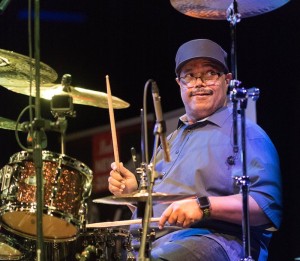 Does that change depending on who you’re playing with? Like in conversations: some people you have a better connection with than others.
Does that change depending on who you’re playing with? Like in conversations: some people you have a better connection with than others.
Yes, same thing.
For me if I’ve played it, I remember it. There is some music with P-Funk that I haven’t played in 35 years and when I went to see them play I was sitting there trying to remember it. Then we cut it off and my hands just went on auto pilot. They just got me through it. All of a sudden I thought “Ah, something is supposed to happen, something is coming up, I can’t remember it” but right at that moment it just came back and I did the right fill. It just happens. It’s amazing but it was scary at first. I was panicking and hoping I wouldn’t screw it up but my mind just wouldn’t let me down.
If you don’t mind I would like to talk about your health struggles in 2014. It’s amazing we have you back here on the big stage! Was wanting to get back onto the drum throne a bit of a push in your recovery?
Well I gotta tell you man, I took a year off. Doing that year off I didn’t play at all. Pearl had sent me this gigantic kit that was sitting in my living room for a year and I never touched it other than setting it up and tuning it. I didn’t have a desire to play; and I didn’t know whether I was gonna play drums anymore until Mike Stern offered me a gig that was close by. I took it just to see how I would feel behind the kit and it all came back and it felt great. Some of my close friends knew I hadn’t played in a year and came to the gig to see what Dennis Chambers was now. After the show everybody said I sounded better than ever
Maybe after all these years of drumming a year off was just what you needed?
For me it was. That’s also the reason I don’t practise – but I play all the time. I don’t practise because your mind is like a computer: what you put in it is what comes out of it. If you overload it or do it too much, it’s not good. For example you practise this rhythm all day long for weeks, you finally get it, it’s in your DNA and then you go and play it with a band and all of a sudden something else hits you in the head and you can’t play it anymore. That’s because you practise too much.
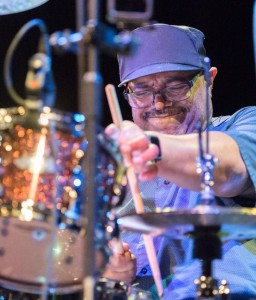 There is always a lot of talk about how drumming changes but you once said “drumming has stayed the same”?
There is always a lot of talk about how drumming changes but you once said “drumming has stayed the same”?
What I meant is that there is nothing new to drumming. Everything you think you’re doing chop-wise has been done. Somebody told me about this drummer levitating with his drum kit the other day, so I showed him the video of Buddy Rich doing it back in the days. Or the stick twirling thing – that was Sonny Payne. There is just nothing new about it apart from how you feel and perceive it. That’s what makes it new.
That’s tricky too though because you don’t hear too many drummers who are playing from their heart anymore. When you hear them play, you hear somebody else. You know, when you hear Steve Gadd, you know it’s Steve Gadd. When you hear Billy Cobham you know it’s him. Same with Vinnie Colaiuta, Jeff Porcaro and Bernard Purdie. Those are drummers drummer. But when you hear other drummers play you can just hear this and that, you can hear where he’s coming out of.
Do you think that’s due to the huge amounts of material on platforms like YouTube (going back to the ‘overstudying’)?
That’s the thing. Before computers, YouTube and all that stuff came in people were into using their ears and imagination to learn. Now it’s too easy. If you wanna learn something just look it up, but it means they sit there playing it exactly like it and don’t get away from that. We’ve all learned something from somebody else but once you’ve learned what that is, us drummers from the 70s just tried to figure out how to make it ours. What would you do if you were in the studio playing on that song, making that record and the same concept?
It can be a hard task to find your own voice though.
No. When you wake up in the morning and roll out of bed. You’re sitting on the side of the bed, your feet hit the floor, you wiggle your toes, checking yourself up while you’re trying to wake up, just being in touch with yourself seeing how you feel. That’s the same thing with then I sit behind the drum kit. When I play I’m not sitting there remembering what Vinnie, Steve or Billy did; I go in there playing from the heart, playing what I feel. If I’m playing a piece of music and as long as I’m not overplaying it, fine. If I’m playing with John Mclaughlin where it requires a lot of chops, then I’m gonna do that; but I’m gonna do it the way I know how, not the way Billy Cobham, Narada Michael Walden or other drummers before me who played with him would have. I can’t do it that way. That’s why John and I are like brothers. He admires people like that because he’s like that too.
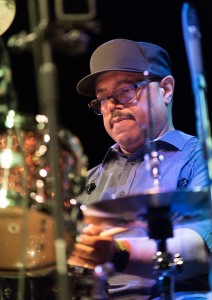 What are your thoughts on where drumming is going?
What are your thoughts on where drumming is going?
I’ve always wanted to talk about that. Drumming should never feel or sound like you’re in a sport. Drummers get together now and try to see who they can out-chop and who’s the fastest. Somewhere they’re getting it twisted because they think that’s what music is about. They sit behind a drum kit, play a groove for like a minute and after that it turns into [mimes crazy drum fill]. Look, when you where conceived in your mothers womb, the first thing you hear is [..plays heartbeat on the table..]. What a beautiful groove. It’s even, it’s got space. You come out and whatever you do in life, you’re always gonna hear that – whether you know it or not. And if you’re a drummer, how could you get away from that? In your mothers womb it wasn’t [plays busy fill on the table].
Why do you think that has become such a trend?
Because you have a lot of drummers – I’m not gonna mention their names – who do these videos about how fast their bass drum beats are, how fast their hands are, how many beats they can stick in a bar and so on. So when a kid sees that they’re mesmerised: “Wow, I wanna learn how to do that!”. They focus on that and go through their whole drumming life trying to be fast.
I don’t care how fast you are, you still got to play music; and if you can’t play music you’re not good for anybody and you can’t play in a band. The metal guys are some really fast drummers and I really admire that but those guys found the music to go along with it and that’s what they do. That’s why they call it metal music and I really enjoy that. But if the music isn’t going that way and you’re back there flying, you just sound like you’re doing a drum solo. And then when somebody gives you a drum solo you have nothing to say. Man, you have failed the mission.
What are your suggestions to get away from that?
Just practise slow stuff for a while. At least work it out that you can do it for five minutes and learn the discipline of just sitting there and playing a groove. If you only know how to play fast and somebody asks you to play a medium tempo you will fail. They can probably play the tempo of it but there won’t be any feel – and that’s why they don’t get called to do other things. Trying to make a career being a one-trick pony is hard. If someone knows you only do metal, they’re not gonna call you to play anything else. If you play all styles of music, or at least listen to all styles of music so you can make them feel well, they will call you.
When I did the Buddy Rich Memorial I was known as the funk drummer. I remember guys asking Cathy [Buddy’s daughter who organises the memorial gigs] why she had hired a funk guy. She just replied: “You’ll see”. I get behind the drum kit, did what I did and people liked it.
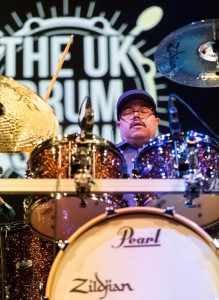 What a lot of people don’t know: three hours before they opened the doors all six of us played together. Guys were getting off the drum kit after a while leaving just Vinnie Colaiuta and I going at it. I was throwing everything but the kitchen sink at this guy and he’s just sitting there laughing at me because we were inspiring each other.
What a lot of people don’t know: three hours before they opened the doors all six of us played together. Guys were getting off the drum kit after a while leaving just Vinnie Colaiuta and I going at it. I was throwing everything but the kitchen sink at this guy and he’s just sitting there laughing at me because we were inspiring each other.
I got together with drummers in my teenage years and twenties and we would get together and just inspire each other. If you happened to have some chops then we’d go there. Larry Bright and I were called the chop brothers. Pushing each other, that’s healthy. But just sit there blatantly try to destroy somebody…. that’s crazy.
They have these things in Baltimore that everybody always wants me to come out and hear. They all got their own cheering section: “Ooooooohhh, he blew you out the water!!”. Oh man… And those guys get their hands kissed and think they’re so good but then the phone isn’t ringing. [laughs]
Who the hell is that? Let’s see how far their careers go.
I’m Dennis Chambers and some of the stuff that falls out of some of those kids mouths and the opinion they have of themselves… I’m looking at that thinking you just don’t know. There are some things I wouldn’t even dream of saying to other people. The respect with these young kids is going man. That’s why I said there is nothing new. They think they’re the greatest thing since sliced bread and everything they’re doing is new but you go: Dude what you’re doing is Tony Williams, that’s Steve Gadd, that’s Vinnie. It’s not new. We did that already. Come up with your own shit, how about that? [laughs]
Finally, what’s next?
I’ve got stuff coming up with Victor Wooten and Bob Franceschini, some things with Mike Stern, some more clinics and some gigs with John Scofield.
Thanks a lot for your time!
Interview by Tobias Miorin
December 2017

